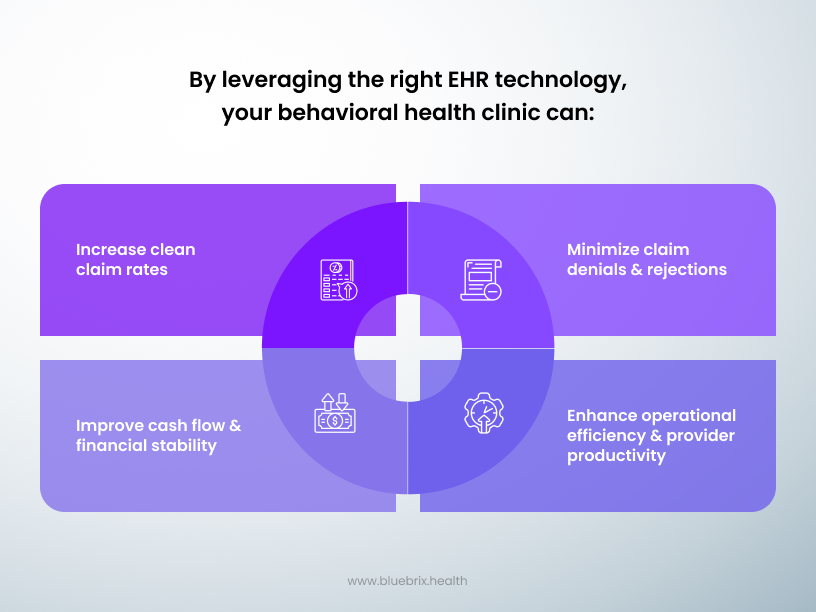Running an outpatient behavioral health clinic involves far more than providing exceptional patient care—it requires mastering the intricate landscape of revenue cycle management (RCM), payer regulations, and administrative efficiency. In an era of evolving reimbursement models, maximizing reimbursement rates is not just about financial sustainability—it’s about expanding access to care and driving clinical excellence.
Clinics that strategically align documentation, coding, prior authorizations, and data analytics with cutting-edge technology can significantly boost reimbursement rates. An all-in-one EHR system purpose-built for behavioral health is no longer a convenience—it’s a necessity.
Here’s how to elevate your reimbursement strategy with expert-level precision:
1. Proactive prior authorizations & real-time eligibility checks
Prior authorization (PA) delays are a major revenue bottleneck, especially for high-cost services like intensive outpatient programs or medication-assisted treatment. Inefficient PA processes can lead to delayed or denied payments, impacting cash flow.
Expert-level tactics:
- Automate eligibility verification: Leverage EHRs with real-time insurance eligibility checks before service delivery to prevent claim denials due to inactive or uncovered plans.
- Proactive PA tracking: Use Behavioral Health EHRs with built-in PA management tools that alert staff when PAs need renewals, preventing coverage lapses.
- Leverage payer portals: Integrate directly with payer portals to automate PA submissions and minimize manual interventions.
Pro Tip: Behavioral health clinics using EHRs with real-time eligibility verification have reported 20% fewer claim denials due to coverage issues.
2. Precision in documentation: the foundation of revenue integrity
Accurate, thorough, and compliant documentation is the bedrock of maximizing reimbursement. According to industry data, up to 30% of behavioral health claims are rejected due to documentation errors or missing information—a costly inefficiency. Incomplete or vague clinical notes not only increase claim denials but also expose your practice to compliance risks.
Expert-level tactics:
- Clinical specificity in notes: Move beyond generic documentation. Capture detailed interventions, patient responses, and clinical rationale. For example, specify if Cognitive Behavioral Therapy (CBT) addressed maladaptive coping strategies versus general emotional regulation.
- Document medical necessity: Tie each service to clear, measurable clinical goals. Use evidence-based language that payers recognize, such as DSM-5 diagnostic criteria references.
- Seamless linkage between notes and claims: Ensure progress notes, treatment plans, and outcome measures are automatically linked to billing codes, demonstrating service validity.
Pro Tip: In Certified Community Behavioral Health Clinics (CCBHCs), precise documentation of co-occurring disorder treatments (e.g., SUD + PTSD) is critical for correct coding and reimbursement. An EHR with built-in compliance checks ensures coding accuracy, minimizing denials.
3. Mastering behavioral health coding: accuracy that drives revenue
Behavioral health coding is uniquely complex, with frequent updates to ICD-10 and CPT codes. Coding inaccuracies, whether under-coding or over-coding, can result in revenue leakage or audits. In 2020, nearly 40% of Medicaid’s nonelderly adult population had a mental health or substance use disorder, underscoring the need for precise, compliant coding to capture appropriate reimbursement.
Expert-Level Tactics:
- Stay ahead of code revisions: Assign a coding compliance lead to monitor annual CMS updates and payer bulletins.
- Optimize service bundling: Leverage appropriate add-on codes (e.g., HCPCS H2017 for psychosocial rehab alongside H2015 for skills training) to capture the full scope of services delivered.
- Implement advanced coding engines: Use Behavioral Health EHRs with real-time auto-coding recommendations based on clinical documentation.
Pro Tip: Clinics with automated CPT code updates in their Behavioral Health EHRs can instantly align with payer changes, avoiding revenue loss from outdated codes.
4. Denial prevention through automated claims management
Claim denials are not just lost revenue—they’re lost time and resources. Behavioral health practices lose between 5% and 10% of their annual revenue due to denied claims. Denial management strategies must be preventive, not reactive.
Expert-level tactics:
- Pre-submission scrubbing: Use Behavioral Health EHRs with automated claim scrubbing to catch errors (e.g., missing modifiers, invalid NPIs) before submission.
- AI-powered denial pattern recognition: Advanced Behavioral Health EHRs can identify recurring rejection codes and suggest claim improvements, reducing future denials.
- Auto-resubmission workflows: Speed up reimbursement by automating corrected claim resubmissions.
Pro Tip: Clinics using AI-powered EHRs report 15-20% faster reimbursement cycles by reducing denials and automating appeals.
5. Revenue optimization through data-driven insights
To maximize reimbursement rates, behavioral health clinics must move beyond reactive billing practices. By regularly analyzing RCM data, clinics can identify revenue gaps, renegotiate payer contracts, and optimize service pricing.
Expert-Level Tactics:
- Trend analysis: Use EHR dashboards to monitor claim denial patterns, reimbursement variances by payer, and underpaid claims.
- Contract renegotiation: Leverage data on service utilization and reimbursement rates to negotiate better contracts with payers.
- Service-line profitability analysis: Identify which services yield the highest reimbursement and adjust clinical focus accordingly.
Pro Tip: Clinics that routinely analyze RCM data have seen 20-30% increases in reimbursement rates, as they can proactively address revenue leakages.
The competitive edge of an all-in-one behavioral health EHR
Maximizing reimbursement rates isn’t just about avoiding denials—it’s about creating a revenue-optimized ecosystem where clinical quality, compliance, and financial sustainability converge. An advanced EHR tailored for behavioral health provides a seamless integration of clinical documentation, coding, billing, and reporting.



